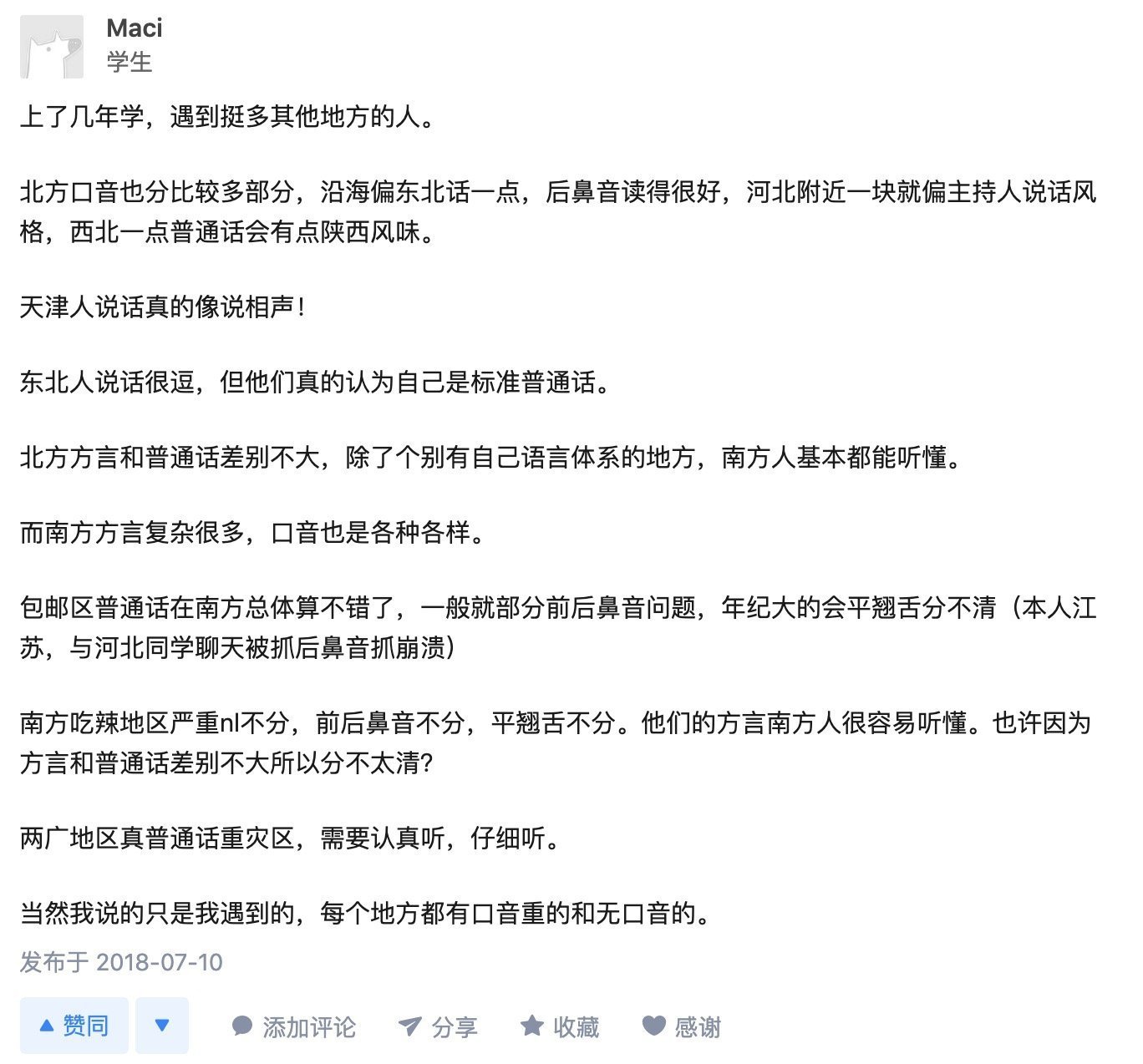Language
Students of Chinese who study abroad often find that the perfect world of textbook dialogues is more of a fantasy. Learning to understand new accents and dialect differences is a difficult but rewarding part of the study abroad experience. Learning to talk about language itself also allows students to ask for clarification on unfamiliar words or grammar.
Student Conversations
No Results Found
The page you requested could not be found. Try refining your search, or use the navigation above to locate the post.
Exercises
Task 1 Sharing Personal Experiences Task (Accents)
Objectives: Students will be able to familiarize themselves with vocabulary and topics related to issues concerning accents and varieties of a language. Students will also be able to understand the sociolinguistic aspects of learning and using a target language. This task could be used as a warm-up task at the beginning of this module. Suggested time for this task: 15-20 minutes.
Directions:
1.1 Listen/Read the dialogue between Mae and 如风 (Language 1 dialogue). In groups of 3-4, discuss what they talked about in the dialogue and retell Mae’s taxi story. Based on the dialogue, why do Mae and 如风 think that the driver did not want to take them?
1.2 Listen/Read the dialogue again. Discuss what you know about accents. Sometimes accents are associated with certain stereotypes (刻板印象), what kinds of stereotypes do you think that are associated with southern accents of English in the U.S.? Can you give some other examples of stereotypes that are associated with different accents?
1.3 In the dialogue, Mae talked about her 国语 pronunciation. “国语” usually means “Taiwanese Mandarin” while “大陆普通话” means “Mainland Mandarin.” Watch the video on Mainland Mandarin pronunciation vs. Taiwanese Mandarin pronunciation (https://www.youtube.com/watch?v=Pmyi8olK_qg), and discuss the questions below.
- What are some differences you noticed between Mainland Mandarin and Taiwanese Mandarin? List at least two aspects and provide an example to illustrate each point.
- After watching the video, how do you feel about Mainland Mandarin and Taiwanese Mandarin respectively? Describe your feelings toward the two types of Mandarin.
Directions in Chinese:
1.1 她们讨论了什么问题?3-4人一组,用自己的话复述Mae讲的关于她坐出租车的故事。根据对话内容,为什么Mae和如风都觉得这个出租车司机故意不想载她们?
1.2 听/读对话。根据你所经历过/学过/听说过/读过的内容讨论口音相关的问题。有的时候不用的口音会和一些刻板印象练习起来。在你的印象当中,在美国南方口音会带给人什么样的印象?你可以再说说不用口音会带给人不同印象的例子吗?
1.3 在对话中,Mae提到了她的”国语发音“。观看视频“大陆普通话发音vs.台湾的国语发音”,并讨论以下问题。
- 在视频中你注意到大陆普通话和台湾国语发音有什么不同?请至少列出两个不同并用例子来解释。
- 观看视频后,你对大陆普通话和台湾国语分别有什么样的印象?请描述你对这两种口音的感受。
Task 2 Sharing Personal Experience Task (Slang)
Objectives: Students will be able to familiarize themselves with the vocabulary and topics related to issues concerning slang and euphemisms. This task could be used as a warm-up task at the beginning of this module. Suggested time for this task: 15-20 minutes.
Directions:
2.1 Listen/Read the dialogues between Ted and 韩 (Language 2 dialogue). In groups of 3-4, summarize the key terms of their discussion. Discuss what you knows about slang and euphemisms.
Discussion questions: What are Ted and 韩 talking about in this dialogue? Based on the dialogue, which word evolved from Taiwanese? How is this word different from other curse words mentioned in the dialogue? Do you know any other slang words in Chinese? Share your knowledge and experience with your group.
2.2 Watch the video on internet slang in China (https://www.youtube.com/watch?v=uf3jTEtuukE) and discuss the questions below.
- List two internet slang mentioned in the video and use your own words to describe the meaning of the words.
- Do you think slang words is important for language learners? Why or why not?
Directions in Chinese:
2.1 听/读对话2。3-4人一组,讨论对话的主要内容。根据你学/听/读到的讨论关于俚语的问题。他们在讨论什么?根据对话内容,哪一个词是从台湾话变过来的?这个词和其他对话中提到的词有什么不同?你还知道中文里的什么俚语吗?和你的组员讨论并分享。
2.2 观看视频“中国网络流行语挑战”(https://www.youtube.com/watch?v=uf3jTEtuukE)并回答以下问题。
- 说说视频中提到的两个网络流行语并且用自己的话解释这两个词的意思。
- 你认为俚语/流行语对语言学习者重要吗?为什么(不)?
Task 3 Project & Creative Task (Southern and Northern Accents in Chinese)
Objectives: Students will be able to evaluate and analyze specific issues related to accents in China. Students will also be able to cooperate with group members and practice reading, writing, and speaking skills upon completing this task. This task could be divided into two class hours, after the warm-up discussions on the two dialogues, for instance, first using it as a main activity of a regular class to practice reading skills, and then as a homework assignment to prepare for group presentations. Suggested time for this task: 45 min for the reading for the first class + 100 min for presentation or assigned as homework + 8-10 min per group presentation in the following class.
3.1 Warm-up discussions
Directions:
3.1.1 In Language 1 dialogue, Mae and 如风 talked about southern and northern accents, what are some differences you know between the two? Share your ideas with the group.
3.1.2 In Language 2 dialogue, Ted and 韩 talked about slang/curse words in Chinese. Do you know any other slang/curse words in Chinese? Share your ideas with the group.
Directions in Chinese:
3.1.1 第一段对话中,Mae和如风讨论了南北方口音的问题,你知道南北方的普通话口音有什么区别吗?和你的组员讨论并分享。
3.1.2 第二段对话中,Ted和韩讨论了中文里的脏话/俚语。你还知道什么中文里的脏话/俚语?和你的组员讨论并分享。
3.2 Reading Comprehensions (Suggested Time: 45 mins)
Read the answers for Zhihu (A Chinese question and answer platform) question “北方人听南方人说话or南方人听北方人说话有什么感觉?”并讨论回答问题。
Original Source: https://www.zhihu.com/question/283473600
Answers:
Thread 1

Thread 2

Thread 3

Thread 4

In groups of 3-4, summarize the main point of the four threads in the table below.
Directions in Chinese: 阅读知乎问题,“北方人听南方人说话or南方人听北方人说话有什么感觉?”下的四个回答。三到四人一组,完成下面的图表。
Download Worksheet Here: Language_Worksheet 1
3.3 Presentation task (100 min in class or assigned as homework)
Directions: Now that you’ve learned more about accents and language varieties in China, discuss the topic on “Foreigner Accents” and prepare an 8-10 minute presentation in groups of 3-4. Before preparing the presentation, watch the video on “Foreigners’ Accents Speaking Chinese” (https://www.youtube.com/watch?v=geWie7AS_Yw). First, based on what you know, list some key features of ‘foreigner accents’ when speaking Chinese and provide some examples. Then discuss your evaluation of “外国人说中文的口音“, do you think it is a bad thing to have a foreign accent? When learning a language, do you think being able to “speak like a native” is important? Why or why not? Finally, summarize your presentation and provide your advice to future language learners.
Directions in Chinese: 这一课我们了解了语言的口音和方言问题。3-4人一组,讨论话题”外国人说中文的口音“并准备一个8-10分钟的报告。在准备报告之前,先观看视频“哪国人说中文的口音最搞笑?”。首先,根据你看过/听过/学过的,说一说“外国人说中文的口音”可能会有哪些特点,并且举例介绍。然后讨论你觉得外国人说中文有口音真的是一件不好的事情吗?学习语言的时候,说话“像本地人”真的很重要吗?为什么(不)?最后总结报告的内容并给以后要学习中文的学生提出一些你的建议和评价。
Task 4 Additional reading and comprehension question
Directions: Read the article “网络语言可以更有内涵” and discuss the following questions.
Directions in Chinese: 阅读文章“网络语言可以更有内涵” 并回答以下问题。
Original Source: http://tech.ifeng.com/a/20190401/45557482_0.shtml
Reading Texts (Language Revised):
与书信时代相比,网络时代为人们的交流提供了便利,即使远隔万里,也能随时视频连线,分享手机两端的点点滴滴。在飞速发展的互联网环境下,年轻人越来越倾向于使用网络用语传情达意。
但是,不容忽视的是,网络语言虽然有时幽默活泼,但也存在缺乏文化内涵的问题。很多习惯于使用网络用语的年轻人,语言越来越贫乏。
最近,据中国青年报社社会调查中心联合问卷网进行的一项调查显示,76.5%的受访者感觉自己的语言越来越贫乏了。受访者认为,年轻人语言贫乏的表现是基本不会说诗句和不会用复杂的修辞手法。对于年轻人出现语言贫乏的问题,70.9%的受访者认为是由于互联网时代要求更加直接和简洁的表达,65.4%的受访者归因于同质化表达、全民复制的网络氛围。
庆幸的是,一方面是76.5%的受访者感觉自己的语言越来越贫乏;另一方面,75.2%的受访者建议年轻人训练自己的语言逻辑。所以,强化语言逻辑,大多数人还是认同的。
要做到这些,对个人来说,学会独立思考,训练自己的语言逻辑,十分重要。
因此,对于网络语言,没有必要一味地排斥,毕竟它是网络时代的产物,简单、直接地表达也是顺应了互联网时代的发展趋势,它的产生不是偶然的,而是在一定的社会土壤之上成长出来的。
同互联网一样,网络语言也是新兴事物,也需要更多引导,让它走在正确轨道上,便能为人类的发展做出积极的贡献。
讨论问题:
- 网络语言有什么样的特点?
- 越来越多的年轻人使用网络语言,这有什么好处?有什么坏处?
- 你对网络语言有什么看法?

